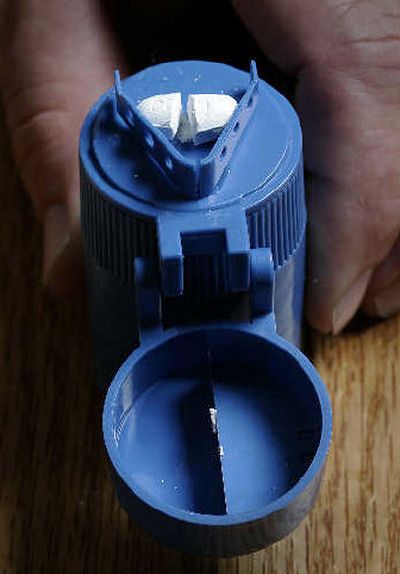Divide and conquer

MILWAUKEE, Wis. — Chopping his Lipitor tablets in half gives Randy Schneider a little thrill.
“I kind of chuckle when I do this,” said the 41-year-old line worker at a cheese factory. “It’s like I’m making good money per minute if you figure it out.”
Schneider saves about $31 for a six-month supply, because double-strength pills don’t cost much more than single-strength ones. It takes him 10 minutes to cut the 90 pills in two, and he gets the same supply of cholesterol medicine for less money.
Now, the nation’s second-largest health insurer, UnitedHealthcare, is getting behind the practice, giving away pill-splitters and providing advice on which drugs can be safely cut in half.
It is offering half-price on drugs for those who split double-strength pills, cutting the patient’s insurance copayment in half as well.
“It has the potential for meaningful savings,” said Tim Heady, CEO of UnitedHealth Pharmaceutical Solutions, a division of UnitedHealthcare, based in Edina, Minn.
“For every patient that chooses to reduce their costs by 50 percent, it would reduce ours and their employer’s cost by half of the cost of that prescription as well,” he said. “The question is how many consumers would be willing to participate.”
Seniors have split pills to cut costs with the help of their doctors and pharmacists for years. But recently insurers have promoted it as studies have shown it can save massive amounts on purchasing drugs — a key driver of increased premiums.
The U.S. Department of Veterans Affairs said in November it managed to save $46.5 million a year by having 1.1 million patients split one cholesterol drug alone — Zocor.
The Regence Group, a health insurer operating in Oregon, Washington, Idaho and Utah, saves $5 million a year through pill-splitting, which it began promoting 18 months ago.
The practice helps contain costs as newer, more expensive drugs replace older, cheaper ones, and as people take more and more medicine, said Regence’s vice president of pharmacy services, David Clark.
“With all those pressures (that tend) to increase pharmaceutical costs, this is one of the elements that reduces those pressures,” Clark said.
UnitedHealthcare began its voluntary program across Wisconsin on June 1, sending out letters to 10,500 patients to promote it. The insurer plans to take it nationwide for 12.5 million drug benefit subscribers before year’s end, Heady said.
Among the 15 pills the insurer recommends splitting are expensive cholesterol drugs such as Lipitor, antidepressants such as Zoloft, and blood pressure pills such as Aceon and Diovan.
Those pills can be split easily without any adverse effects, Heady said.
“Say one day you get 30 percent of the tablet and the next day you get 70 percent,” he said. “What we’ve been able to determine is that doesn’t really have an impact on efficacy or safety.”
But Pfizer Inc., the maker of Lipitor and Zoloft, disputes that finding. Splitting a pill and leaving it in a steamy bathroom, for example, could change the nature of the drug, said the company’s Dr. Mark Horn. It amounts to an “unlabeled use of our medicines” that has not been rigorously tested, Horn said.
“An experiment is being conducted on the people who are being encouraged to pill-split.”
The federal Food and Drug Administration does not regulate pill-splitting, but says there are risks such as forgetting to split pills, slicing time-release pills or unevenly breaking ones for which a precise daily dosage is needed.
It is crucial to have the consent of a doctor, said Tom McGinnis, FDA’s director of pharmacy affairs. Doctors can judge whether a patient is capable of splitting pills, or whether they are likely to forego taking their medicine if they feel it’s too expensive.
“The important thing is for patients to get a dose of their medication, and if it’s the only way they can afford to be on a statin (cholesterol-reducing) drug, I think a doctor would think that was reasonable,” McGinnis said.
The nonprofit research group, Center for Studying Health System Change, said last month that more than 18 percent of U.S. adults did not fill at least one of their prescriptions in 2003 because of the cost.
The center’s president, Paul Ginsburg, said pill-splitting was unorthodox but effective in increasing access to care.
“It may be the difference between being able to take the drug and not being able to,” he said.